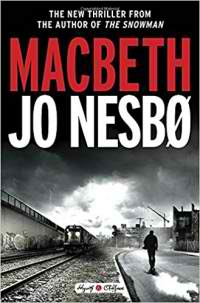Macbeth by Jo Nesbø
 Wednesday, May 2, 2018 at 9:26AM
Wednesday, May 2, 2018 at 9:26AM 
Published by Crown/Hogarth on April 10, 2018
The new police commissioner, Duncan, has vowed to sweep corruption out of the police department. Duff, the head of the Narco Unit, is on Duncan’s side. A tip encourages him to believe he can bring down the Norse Riders motorcycle gang and Sweno, its leader. He turns down help from Macbeth, who is sitting on the sideline with Banquo, Angus, and other members of the SWAT team in case Duff needs help. Also watching from the sideline is Hecate, the richest drug dealer in town and the man who tipped off the police about Sweno’s receipt of a new drug supply that the Norse Riders are about to offload from a Soviet ship.
One thing leads to another and Macbeth commits a foul deed in support of Duff, whose own deed is even more foul. Not long after that, three sisters sent by Hecate prophesy that Macbeth will be promoted to head the new Organized Crime unit. His wife, Lady, is pleased, but sees that the only path to the top for Macbeth is to kill Duncan. Lady is a cunning manipulator who owns a casino and wants Macbeth to advance so he can shut down a competing casino, but is she as cunning and manipulative as Hecate?
Duncan’s death alone will not bring Macbeth to the top; Malcolm must also go. That creates a conflict between Macbeth and loyal Banquo. Eventually Duff and Angus are also in Macbeth’s sights. No one who opposes the mad police commissioner is safe.
Shakespeare’s Macbeth is a relatively straightforward play about Macbeth’s descent into madness that accompanies (causes? is caused by?) his lust for power. Shakespeare purists might not like the liberties Jo Nesbø has taken, but given that the point of the Hogarth Shakespeare series is to draw upon the themes of Shakespeare’s plays to tell a modern story, I think most Shakespeare fans will be pleased with the way Nesbø has reimagined Macbeth as a modern crime story. Parallels to the play are evident. A drug called “brew” substitutes for witch’s brew. Three sisters brew the drug for Hecate while denying rumors that they add toads’ glands to the tank. Macbeth is haunted by the ghosts of his victims and sees dead men in traffic lights. Lady soaps her hands until they turn red. The city is at war, but it is a war between the police and two criminal gangs that also war with each other. Macbeth is sure that no man born of woman can kill him but . . . well, you know how that works out.
And of course, the parallels to the play are evident in the novel’s themes: ambition, manhood, corruption, guilt, betrayal, weakness, and in the end, justice. Nesbø uses Lennox to suggest that weakness is a natural reaction to threats made by those with power; cowardly submission to immoral commands may be shameful, but self-preservation is a powerful instinct, and it is difficult to judge people who submit to manipulation by more powerful forces rather than forfeiting their own (or their childrens') lives. Weakness is also a facet of Macbeth’s love of Lady, as described by Hecate: “The desire to be loved and the ability to love, which gives humans such strength, is also their Achilles’ heel. Give them the prospect of love and they move mountains; take it from them and a puff of wind will blow them over.”
The story mixes in modern themes, as well, including the excessive use of force as a law enforcement tool and manipulation of public opinion to support authoritarian action even when those in authority act lawlessly. Small moments of decency set ordinary people apart from powerful Macbeth and his corrupt followers, suggesting that decent but seemingly unimportant people have the power to change world. When a radio reporter urges listeners to “take to the streets and depose Macbeth,” the reader imagines that people might actually be able to empower themselves with collective action against despots and autocrats.
Nesbø illuminates the complexity of Macbeth’s character: villainous at times but troubled by a conscience; merciful at times, but not when mercy would stand in the way of ambition; a murderer, but as Duff points out (perhaps too charitably), reluctant to kill the innocent. He is driven more by his need to please Lady than by power for its own sake.
The Hogarth Shakespeare novels supposedly “retell” Shakespeare’s plays. The entries I’ve read have been good, but this is the only one I’ve seen that is penned by a crime novelist. Nesbø was a fitting choice to write about the murderous Macbeth. His choices are sound and his use of imagery is stunning. More importantly, Nesbø does justice to a play about justice.
RECOMMENDED
Reader Comments